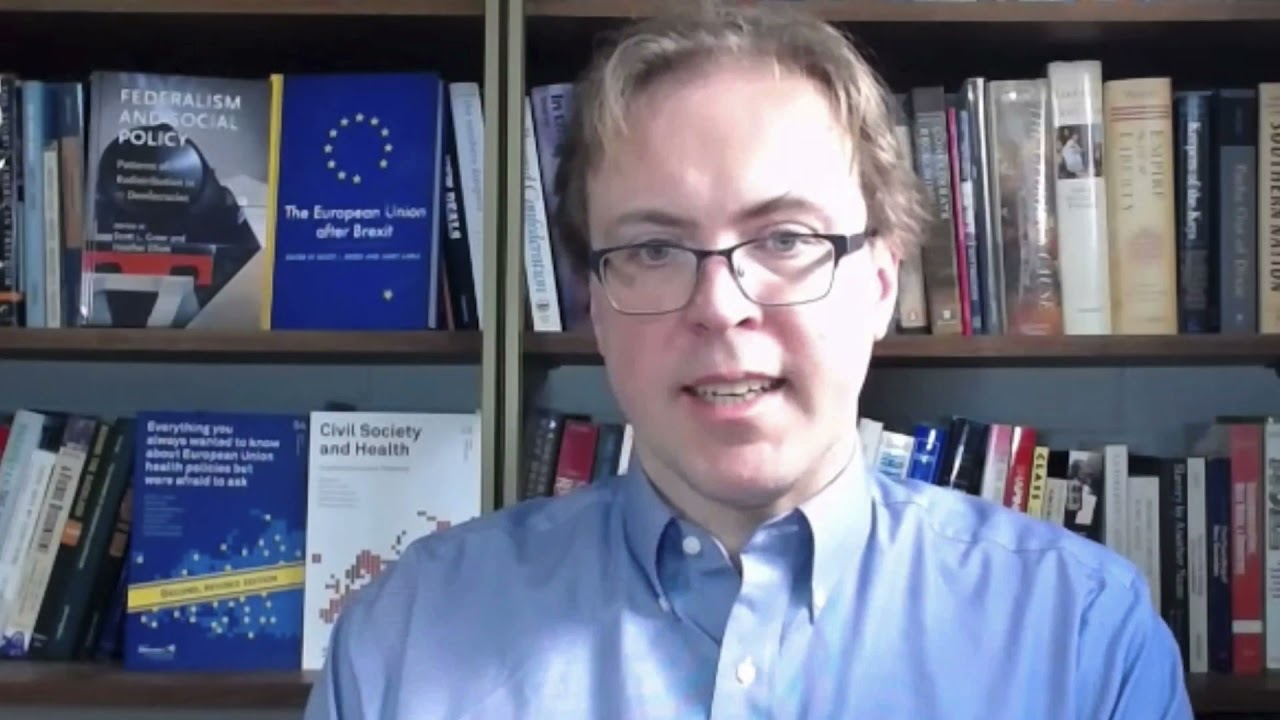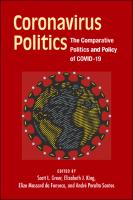Author success story
Context about the authors:
- Scott L. Greer, PhD is Professor of Health Management and Policy, Global Public Health, and Political Science (by courtesy) at the University of Michigan and is also Senior Expert Advisor on Health Governance for the European Observatory on Health Systems and Policies. He researches the politics of health policies, with a special focus on the politics and policies of the European Union the politics of public health, and the impact of federalism on health care. Before coming to Michigan, he taught at University College London.
- Elizabeth J. King, PhD, MPH, is an Associate Professor in Health Behavior and Health Education in the School of Public Health at the University of Michigan. She is also Associate Director of the Center for Russian, East European, and Eurasian Studies. As a global health scholar, she studies women’s health, gender-equitable access to prevention and health care services, and disparities in engagement in HIV care and treatment. The majority of her research focuses on Russia, where she has more than 15 years of experience. She has also conducted research in Kazakhstan, Serbia, Ukraine, Ethiopia, and Uganda.
- Elize Massard da Fonseca, PhD, holds a doctorate in Social Policy from the University of Edinburgh and in Public Health from the National School of Public Health in Brazil. She is a non-resident Visiting Fellow at the Latin America and Caribbean Centre and Assistant Professor of Public Administration at the São Paulo School of Business Administration, Getúlio Vargas Foundation (EAESP/FGV) in Brazil. Her research relates to political institutions, political economy (qualitative) of public health policies, and pharmaceutical regulation in Latin America.
- André Peralta-Santos is a medical doctor and a public health specialist.
Please provide some background information on the research project, book origin, adjacent research, and/or network enabling the book
Coronavirus Politics unifies a global network of scholars to identify key threads in the global comparative discussion that continue to shed light on the COVID-19 pandemic, and did so in an astonishingly rapid response to the first year of pandemic policies upon publication in April 2021. The book seeks to shape debates about what it means for scholarship in healthcare and comparative politics, and utilizes a mixture of comparative, thematic, and templated country studies to establish its argument. Coronavirus Politics identifies key threads in the global comparative discussion that continue to shed light on COVID-19 and shape debates about what it means for scholarship in health and comparative politics.
What was/were your motivation(s) for wanting to publish this book?
Coronavirus Politics became one of the earliest books to be published on the COVID-19 pandemic that took a global perspective. Making sense of this constant stream of information from governments was our goal as editors (with Elize Massard da Fonseca, and André Peralta-Santos). We brought together over 30 authors versed in politics and the health issues in order to understand the health policy decisions, the public health interventions, the social policy decisions, their interactions, and the reasons. The book not only provided a framework for understanding COVID-19 through a public health lens, but also commemorates the dedication public healthcare professionals showed in the first phases of one of the most devastating and significant global crises of any of our lifetimes.
Please give some information on the funding behind the research / book / network
Most of the funding for the book came from the International Institute at the University of Michigan. It also received support from the Fund to Mission program at the University of Michigan Press that brings together support from a cohort of libraries and matching investment from the University of Michigan’s Provost’s Office.
Was the book made available on your own website, or the website of any other editors or contributors, or your institution? If so, please state which.
We made sure that the book was available on our ORCID profiles, but we had some difficulties getting the book or chapters featured on author profiles in our own institutions. Some of the issues we encountered were featured in this blog post on the publishing site, The Scholarly Kitchen: https://scholarlykitchen.sspnet.org/2021/12/06/guest-post-scholarly-book-publishing-workflows-and-implications-for-rim-systems/
Open access success story:
Because the book has a DOI, we preferred to link to this record so that our publisher, the University of Michigan Press, could track as much usage as possible and so that Altmetric data could be gathered. Usage is the currency of open access and evidence of use and engagement, especially internationally, helped us and our contributors justify the decision to publish the work OA. This is the DOI: https://doi.org/10.3998/mpub.11927713, here is the Altmetric page: https://umichpress.altmetric.com/details/91657711, and here is the dashboard through which we track usage across multiple platforms: https://ebc.press.umich.edu/impact.
What makes this book successful?
The book provided a comparative framework for studying COVID-19 early in the pandemic; it provides truly international coverage, and was written by leading scholars and practitioners who weren’t afraid to criticize as well as applaud different regional approaches. It was also produced extremely quickly by U-M Press, using a rolling peer review process, and was one of the first books available on the pandemic.
Why did you choose to publish this book open access?
Because the book was available soon after the pandemic started, the results and analysis had the potential to shape continued responses to the crisis. By learning from the issues they had encountered in early 2020, especially what responses had worked and what had not, they were able to improve their reactions to the delta and omicron waves. Having the book OA was a crucial part of making the information available internationally and outside as well as inside academia.
Do you think that open access publication helped the book and if so, why?
Yes, we definitely think it helped. Altmetric.com noted that our book was the most discussed monograph in 2021: https://www.altmetric.com/blog/top-100-2021-techno-remix/ Even more meaningfully, the responses from readers that U-M Press gathered through an online survey tool showed that it has been useful to policymakers, students, and public health professionals all over the world.
Did your OA book show immediate success upon publication, or did the success unfold more slowly over time?
It took off fairly quickly because we have good networks around the world and shared the availability actively, especially on Twitter.
If early signs of success started to show, did you try to reinforce this in an unusual or creative way?
We conducted some well-attended webinars, and the book was also picked up by journalists – especially in Brazil after the University of Michigan news service did a press release in Portuguese.
Did open access help to reach unreachable / unknown / unexpected / new audiences? If yes, how do you know this?
Yes. We were pleased to see the Twitter use in Latin America that shows up on the Altmetric report - in 2021 ca. 17% of the total activity came from Brazil: https://umichpress.altmetric.com/details/91657711. Also the reader report from the U-M Press OA survey shows some unexpected users, including lay readers who just wanted to understand how their governments were responding.
Did open access make new connections / follow-up possible?
This is difficult to say because the contributors are already highly connected in the world of public health policy. However, it is good to see the crossover into public policy: https://umichpress.altmetric.com/details/91657711/policy-documents
Is there any long tail (awareness, citations, downloads) of this book that you consider would (most likely) not have happened with print sales only or toll-access?
It’s too early to tell, but we’re struck by how a citation pattern is already starting to emerge - less than a year after publication: https://umichpress.altmetric.com/details/91657711/citations. This is somewhat unusual for a book.
How do you think academia can benefit from your book being OA?
Academics outside North America and the UK are the main beneficiaries, and this is important for the extremely international field of public health. It’s also striking from the reader reports U-M Press has provided how many students in Master’s programs are already using the book in their own writings.
We’ve had some nice comments from reviewers as well:
- “Policy responses to pandemics are political and politicized. How different countries respond to the same global health challenge is often determined by domestic and international factors. In Coronavirus Politics, Greer and co-editors assemble a stellar cast of authors to shed important light on how and why COVID-19 responses have succeeded or failed. Essential reading to understand the comparative politics of responses to SARS-CoV2.” - Raul Pacheco-Vega, FLACSO México
- “This volume seeks to both describe and explain health and social policy responses to COVID-19 during the first 10 months of the pandemic. This is a coherent and impressive collection that scholars interested in the politics of COVID-19 and/or policy responses to the pandemic should read and engage with.” - Daniel Béland, James McGill Professor of Political Science, McGill University (Montreal, Canada)
- “In the rapid global unfolding and sharing of scientific information, governments have responded in divergent ways to manage the COVID-19 pandemic. This timely volume is an ambitious start to unravel what shapes these various policy and political responses. The exploration of multiple hypotheses represents a strong contribution to the commencement of global conversations about what we can learn and how we can do better for the future.” - Vivan Lin, University of Hong Kong
How do you think society at large can benefit from your book being OA?
Public policymakers were a particular target audience for our book, so they could use the information we had learned and structured to strengthen their responses to later phases of the pandemic. There are also concerned citizens around the world who we hope will be able to access vetted information that they can be confident in amidst a sea of misinformation. We’re pleased to see the book already being cited on Wikipedia pages, for example.

This article is made available under a Creative Commons Attribution 4.0 International License.




